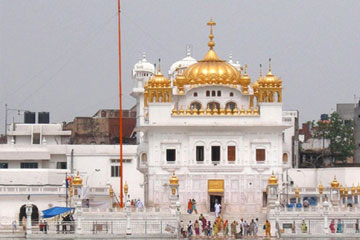Gurudwara Shri Tarn Taran Sahib

Gurudwara Sri Tarn Taran Sahib is a Gurudwara established by the fifth guru, Guru Arjan Dev. It is situated in the city of Tarn Taran Sahib. It has the distinction of having the largest Sarovar (Water pond) of all the gurudwaras. Also, it is famous for the monthly gathering of pilgrims on the day of Amavas (No moon night). It is near Harmandir Sahib, Amritsar.
The main religious center at Tarn Taran Sahib is Gurudwara Sri Darbar Sahib, founded by Sri Guru Arjan Sahib Ji in 1590. Gurudwara Sri Darbar Sahib Tarn Taran has the biggest and largest Sarovar (holy tank) in the world. The foundation stone of the Darbar Sahib was laid by Baba Budha Ji (1506–1631). A leper asylum established by Guru Arjan (it was thought that minerals in the water of the Sarovar were helpful in treating leprosy). Later, Sri Guru Hargobind Sahib Ji came to the Gurudwara and stayed for some time. Sri Guru Tegh Bahadur Ji also visited Tarn Taran Sahib and preached to the Sikh Sangat.
One of the largest of the Sikh serovars (ponds), it is an approximate rectangle in shape. Its northern and southern sides are 289 and 283 meters (948 and 928 ft), respectively, and eastern and western sides 230 and 233 meters (755 and 764 ft), respectively. The Sarovar was originally fed by rainwater that flowed in from the surrounding lands.
In 1833, Maharaja Raghubir Singh of Jind had a water channel dug, connecting the Sarovar with the Lower Kasur Branch of the Upper Ban Doab Canal at Rasulpur watermills, 5 kilometers (3.1 mi) to the southeast. The channel was cemented and covered in 1927-28 by Bhai Gurmukh Singh and Bhai Sadhu Singh. They also supervised Kar Seva, ie. the complete desilting of the Sarovar through voluntary service, in 1931. The operation was repeated in 1970 under Bhai Jivan Singh. Most of the bungs around the Sarovar have now been demolished and a verandah constructed instead along the periphery.
The name Tarn Taran, since appropriated by the town itself, originally belonged to the Sarovar, so-called by Guru Arjan. Literally, it means, "the boat that takes one across (the ocean of existence)". (Tarana in Sanskrit is a raft or a boat). According to Sikh tradition, the water of the old pond was found to possess medicinal properties, especially for curing leprosy. For this reason, the Sarovar was known also as Dukh Niwaran, the eradicator of afflictions.

Send Query to Book Gurudwara Shri Tarn Taran Sahib